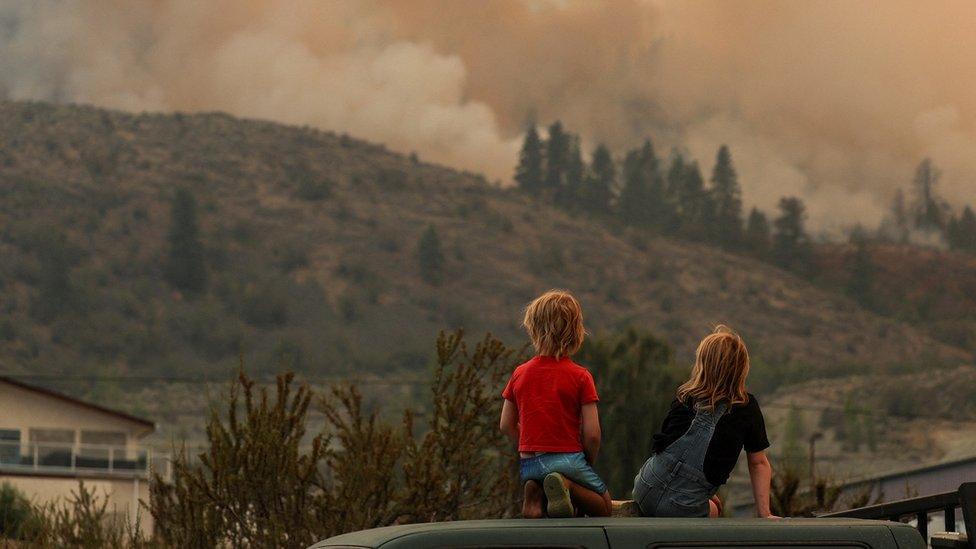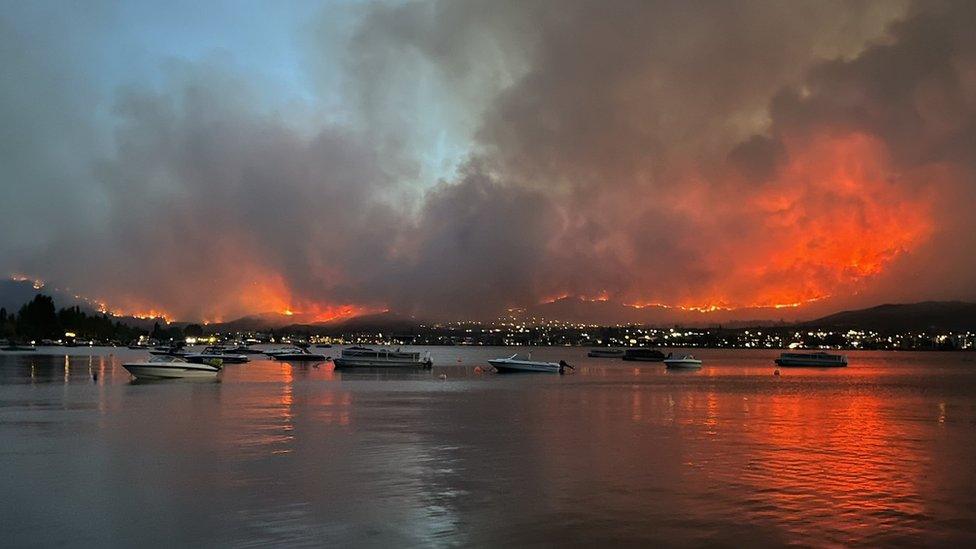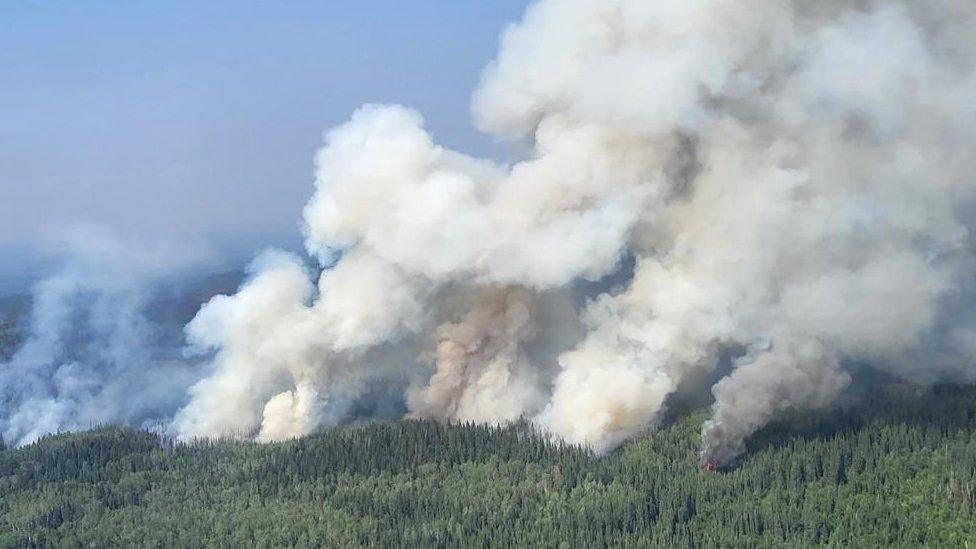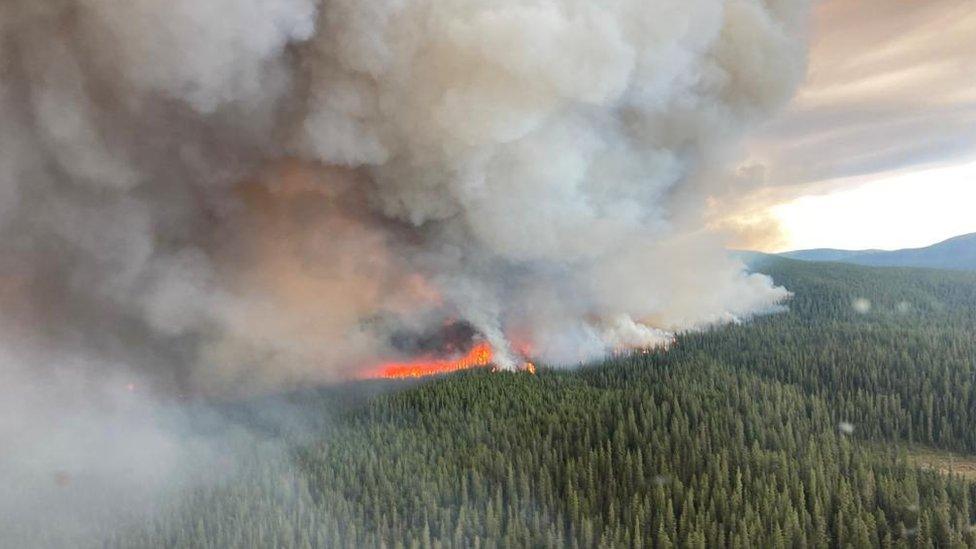Canada wildfires: Border blaze forces evacuations
- Published

Local children watch firefighting efforts amid heavy smoke from the Eagle Bluff wildfire
Evacuations were ongoing on both sides of the US-Canada border as dangerous wildfires continue to spread in the Pacific Northwest.
US residents near Oroville in Washington state were told to leave their homes on Sunday to escape the Eagle Bluff fire.
Some evacuation orders were lifted on Monday in the Canadian town of Osoyoos.
Four people have died fighting fires during Canada's worst wildfire season on record.
The American Red Cross said it had set up an evacuation centre in Oroville, a town of nearly 1,700 people about four miles (6.4 km) south of the border.
Osoyoos in British Columbia is a town of 5,500 people about two miles north of the border.
"This fire has been going for less than 48 hours but it feels like two weeks," Mayor Sue McKortoff said at a media briefing on Monday.
She called progress fighting the fire "an amazing feat", but noted conditions are expected to be hot and dry over the coming days.
Just under 200 properties were under evacuation orders in and around Osoyoos as some people were allowed to return home on Monday.
People in another 2,635 properties have been told they might have to leave on short notice.

The fire caught some tourists off guard, including Walter Wells and his wife, who were celebrating their 25th wedding anniversary.
On Saturday afternoon, he spotted some smoke on the horizon in Osoyoos, he wasn't too concerned because it was coming from "a fire far away in the US", he told the BBC on Monday.
The couple went out for dinner and dancing, but late in the evening they looked across the water and "we were stunned", he said.
"There are hills just west of Osoyoos and a range of hills to the south," he said. "There's this huge, massive line of orange. Fire was just cresting the hill."

Fire crests the hills in Canada, where hundreds have been evacuated
When they got back to their hotel it was under an evacuation alert. Less than a mile to the west people had been asked to leave their homes because of the threat.
"The mountain was on fire and I was terrified," he said. They considered leaving but decided to stay the night in the hotel. It was a sleepless one.
Fire crews worked overnight and on Sunday, the couple watched water bombers working to control the blaze.
But as smoke settled over the town the couple left, driving north that afternoon to stay at a family cabin.
They drove 57 miles (92km) before the air was clear, Mr Wells said.
In an update on Monday, the BC Wildfire Service said the 1,450 hectare (3,600 acre) fire did not grow overnight but remained out of control. It is about two-and-a-half miles southwest of Osoyoos.
The cause of the fire is under investigation.
More than 1,000 wildfires are currently burning across Canada, and 664 are classed as "out of control", according to the Canadian Interagency Forest Fire Centre.
A third of the fires are alight in British Columbia, the country's westernmost province.
Fires in eastern Canada blew huge clouds of smoke over heavily populated areas and significantly worsened air quality in eastern and central North America earlier in the year.
Among the firefighters who have died while tackling the blazes was a 25-year-old who died on Friday in north-eastern British Columbia.
"I am heartbroken that another firefighter was lost protecting our communities and our province during this devastating wildfire season," said Bruce Ralston, the province's forests minister.
So far this season, Canadian wildfires have burned more than 31 million acres of land - more than the area of Cuba.
July is set to be declared the world's warmest month on record, according to scientists, and some experts think it could be the warmest month in 120,000 years.
Climate change increases the risk of the hot, dry weather that is likely to fuel wildfires.
Watch: The 'world's hottest month' explained... in 60 seconds
Related topics
- Published21 July 2023

- Published17 July 2023
